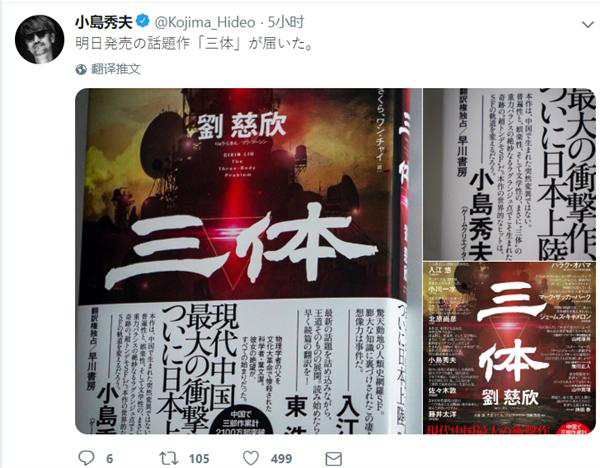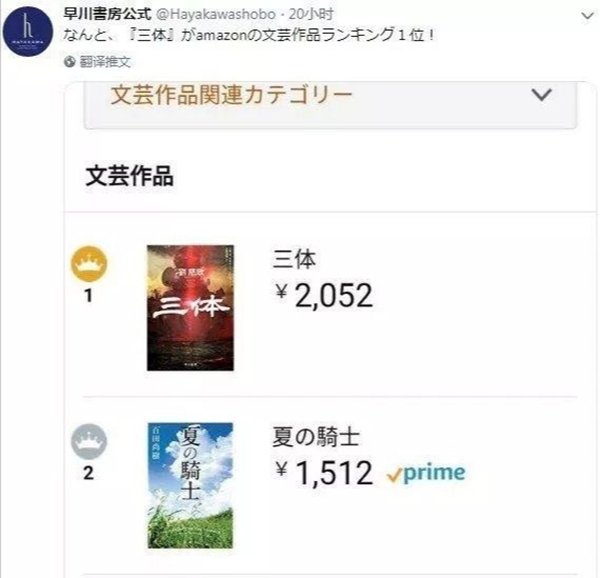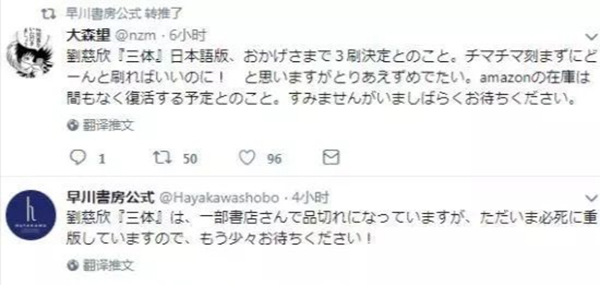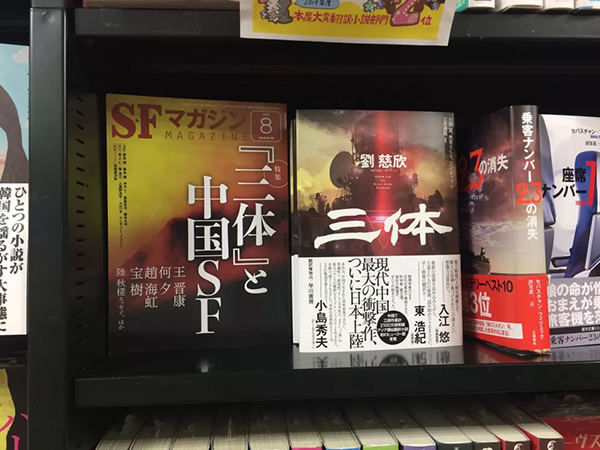
As soon as it was listed, it sold out of stock, and "Three-body" was greatly loved by Japanese readers.
On July 4th, the Japanese version of "Three-body" went on sale, and some bookstores quickly sold out, ranking first in the list of Japanese Amazon literary works. To this end, the largest science fiction publishing house in Japan, which is responsible for the Japanese version of Three-body — — Hayakawa’s study room had to quickly explain on social media that "we are grasping the third printing, please wait a little".


"Earth-shattering science fiction covering all aspects of human history", "Once you start reading, you can’t stop, please translate the sequel quickly" and "unparalleled imagination is really amazing" … … As early as the previous trial reading meeting, Japanese writers and screenwriters, including Hideo Kojima, Hiroki Azuma and Y? Irie, the top game designers in Japan, gave high praise, and the waist cover of the novel was full of recommendations from big coffee in the industry.
With the Japanese version of Three-body released, Hayakawa Study also held exhibitions and sales meetings of Chinese science fiction and reasoning works in major bookstores, involving works such as short masterpieces 1-3 and Rebirth by China science fiction writer Liu Yukun, Sacrifice of Spring in the First Year by Lu Qiucha, Beijing Folding-Selected Works of Modern China Science Fiction, and Variations by Diogenes by Chen Haoji.
SF magazine, a science fiction magazine owned by Hayakawa Study, will also publish some works of China science fiction writers and articles written by three scholars on Three-body and China science fiction in its August issue with the theme of "Three-body and China science fiction writers".
Can the popularity of "Three-body" open the China science fiction craze in the Japanese market? The Paper interviewed Yamaguchi, editor-in-chief of the "Three-body" project team in Hayakawa Study Room, and talked about the development and present situation of Japanese science fiction and his understanding of China’s science fiction.

[Dialogue]
The PaperHow did you feel when you first read Three-body?
Yamaguchi crystalI once read Liu Cixin’s short stories and thought that the author might be a genius. After watching "Three-body", I believe he is a real, real genius! Reminds me of my feelings when I read The End of Childhood by Arthur C. Clarke (Arthur C. Clarke) or Base Series by Isaac Asimov (isaac asimov) when I was young. Three-body is what I want to see.
The Paper: What touched you? How do you understand the "naokou" in the novel?
Yamaguchi crystalExcellent storytelling ability and the author’s deep understanding of history, science and philosophy, and the perfect combination of the three. The beauty of Three-body is not only technology and knowledge, but also Liu Cixin’s powerful imagination, which constantly surprises readers and always exceeds our expectations. After Three-body won the Hugo Award in 2015, it took us three years to win the copyright of this novel in Japan.
"Naoko" is like a metaphor against progress, rationality and peace in the real world. There are always things like Naoko in our society.
The PaperHow do you interpret the relationship between "earthlings" and "threesomes"?
Yamaguchi crystalI am not in favor of parallelizing or comparing the relationship between "earthman" and "three-person" with the relationship between China (or Asian) culture and western culture. It has a more universal meaning, which can be "new and old", "poor and rich", "small and big", or just "human and aliens". It is precisely because of this universality that "Three-body" is more entertaining and meaningful and has become a global bestseller.
The PaperDo you have any expectations for sales?
Yamaguchi crystalWe hope to sell 1 million copies of the first volume, but the goal at this stage is 100 thousand copies.
The PaperCan you introduce SF magazine and its influence on Japanese science fiction?
Yamaguchi crystalAs early as 1959, Hayakawa study room founded SF magazine, which is the second oldest science fiction magazine in the world. For decades, it has trained a large number of Japanese science fiction writers.
Japanese science fiction began to sprout and develop under the influence of American science fiction. The first issue of SF magazine published the works of Arthur C. Clarke (Arthur C. Clarke), Issac Asimov (isaac asimov), Philip K. Dick (Philip K. Dick) and Robert Sheckley (Robert Sheckley), which inspired and enlightened many young people who wanted to be novelists. In addition, writers such as Robert A. Heinlein (Robert A. Heinlein), Kurt Vonnegut (Kurt Vonnegut Jr.), Ray Bradbury (ray bradbury) and William Gibson (William Gibson) are often introduced and mentioned, thus influencing a group of Japanese science fiction writers, whose works and influence are still popular and exist among readers.
The PaperWhat is the development of Japanese science fiction? What are its characteristics?
Yamaguchi crystalThe characteristics of Japanese science fiction are very diverse, and each generation of authors has its own distinctive characteristics. For example, the first generation of science fiction writers in 1960s, such as Sakyo Komatsu (Komatsu sakyo), Shinichi Hoshi (hoshi shinichi) and Yasutaka Tsutsui, Yasutaka Tsutsui, will surprise you when reading their works. Komatsu sakyo is famous for hard science fiction, while hoshi shinichi’s stories have fable-like flashes. Yasutaka Tsutsui is characterized by experimental novels that play abuse.
Most of the first-generation writers have passed away. The second-generation writers in the 1970s, the third-generation writers in the 1980s, and the fourth-generation writers in the late 1980s and 1990s are still active in the literary world, publishing various types of works, such as hard science fiction, space opera, fantasy, military adventure, humor, Cyberpunk, literary science fiction and light novels.
Japanese science fiction experienced what we call the "severe winter" in the 1990s, but in the 21st century, a new generation of writers such as Project Itoh (Project Itoh), Hitotaka Tobi (Fei Haolong), Ogawa Yishui and Toh Ubukata (Tou Ubukata) appeared, and Japanese science fiction became popular again. In particular, Project Itoh’s "Killing Organs" and "Harmony" are the milestones of the revival of Japanese science fiction.
In addition, Japanese science fiction is closely related to comics, animation and video game industries, and classic cartoonists such as Osamu Tezuka and Reiji Matsumoto were influenced by the early science fiction movement. Even in this century, film directors such as Makoto Shinkai (Makoto Shinkai, masterpiece Your Name) and Sunao Katabuchi (film must be straight), and game producers such as Hideo Kojima (Hideo Kojima, masterpiece Metal Gear Series) are also loyal fans of science fiction.
The PaperWhat is the popularity of Japanese science fiction in the market at present?
Yamaguchi crystalIf we only talk about the publication of science fiction books, we can’t say that it is very big. The sales volume has been relatively stable and there are fixed readers and fans. However, if anime and animation are included, the market is huge. Many cartoons and animated films and TV programs have sci-fi elements, such as robots, time travel, future world and so on.
However, these readers are very loyal to science fiction. They have their own reading and study groups, and they also organize activities and vote for awards. Every year, the fan group votes for the Seiun Award (the most sci-fi work and novel award in Japan), which is equivalent to the nebula award in the United States. It is also very active on social media.
The Paper: which countries and themes of science fiction are more popular? What are the criteria you choose?
Yamaguchi crystalScience fiction in China is very popular, and we expect that science fiction in non-English speaking areas will be the next trend. Asian science fiction mainly comes from China, and it will be a development window in the next two to three years. I hope so. There are many themes, and it is hard to say which ones are the most popular, but topics such as artificial intelligence, feminism, brain-computer interface, human-computer interface, dystopia, monitoring, robotics, information pollution, thinking uploading, genetic modification and space exploration will all have great attention and importance.
We always pay attention to sales data and marketing data, but these figures can only explain what readers want now, not next year or five years later, which requires our professional to judge and predict the future trend. In the selection of works, in addition to Japanese local science fiction, we have also established a good cooperative relationship with Science Fiction World in Chengdu, China. Science Fiction World will also recommend some short science fiction novels from China to us, and we will also consult some of our own science fiction writers.
The PaperWhat impression did China’s science fiction leave on you? Are there obvious characteristics differences between Chinese and Japanese sci-fi works?
Yamaguchi crystalThe three most obvious characteristics that China’s science fiction gave me are: first, a strong imagination; Second, anxiety about the rapid growth of economy and technology; The third is the nameless fear for the future. As for the differences between the two countries, I haven’t read enough China science fiction novels to discuss the differences, but in my opinion, Cyberpunk has a greater influence on Japan, while the proportion of hard science fiction in China’s science fiction novels will be larger.
The PaperJapanese science fiction writer Rihara Toye once said that "Japanese science fiction can’t be as influential as China’s science fiction because we don’t have Liu Yukun (English translator of Three-body)". What do you think of this statement?
Yamaguchi crystalThat’s for sure. Japanese science fiction needs translators like Liu Yukun too much. In addition, I am very sure that the level of some Japanese writers has reached the standard of the world’s top science fiction writers, but for now, we really haven’t seen any science fiction writer who has such a great influence in the world like Liu Cixin.
The PaperWhat impact will the hot sale of "Three-body" in Japan have?
Yamaguchi crystalThere is no doubt that Japanese readers will want to read more China novels. We also firmly believe that Three-body will become a best seller. Hayakawa Study also plans to invest more money to develop the China book market. We hope that not only readers of science fiction, but also other engineers, scientists, researchers, scholars and intellectuals will learn about China’s novels. (The Paper reporter Xu Minghui intern Xu Hangyan)
关于作者